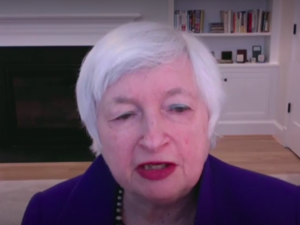
During confirmation hearings before the Senate Finance Committee, Treasury Secretary Nominee Janet Yellen said defeating the pandemic was the clearest path to restoring health to the U.S. economy. She also said concern over skyrocketing debt resulting from pandemic-related stimulus programs was not an immediate issue.
Yellen’s comments came in response to a question posed by Sen. John Thune (R-S.D.), who said borrowing when interest rates are low feels like “free money, but is not. It has to be paid back,” Sen. Thune said. “At some point, the risk-return ratio that people who are lending us money are going to say, is not sufficient for the risk, and they’ll demand a higher interest rate and that will happen. Interest rates will start to normalize. We’ll have to refinance at a higher rate. Soon, interest on the debt will exceed even what we spend on national defense.”
A recent additional stimulus proposal put forth by President-Elect Biden would add $1.9 trillion to the deficit, Thune said, in addition to $3.4 trillion already allocated to COVID-19 relief. Thune cited reports from the Committee for a Responsible Federal Budget, a nonprofit that tracks Federal spending on whose advisory board Yellen has served.
“I agree it’s essential we put the federal budget on a path that’s sustainable,” Yellen said. “But the most important thing we can do today to put us on a path to fiscal sustainability is to defeat the pandemic, provide relief to American people, and then to make long-term investments to help the economy grow and benefit future generations.”
To do otherwise, Yellen said, would result in “scarring” to workers and the economy, and “likely leave us in a worse place fiscally and with respect our debt situation.”
In addition to investing in the economy, its workers and R&D, Yellen said “It’s important to remember that we are in a very low interest rate environment … something that existed before the pandemic hit. Interest rates were low even before the financial crisis of 2008. This has been a trend in developed economies. You can see it across the developed world. It represents structural shifts that are likely to be with us for a long time. So although the debt to GDP ratio has increased, it’s important to note the interest burden of the debt, interest as a share of GDP is no higher now than it was before the financial crisis in 2008, in spite of the fact that our debt has escalated.”
In the first round of questioning, Yellen addressed other topics of interest to committee members, including:
U.S. Dollar: “I believe in market determined exchange rates. The value of the U.S. dollar and other currencies should be determined by markets. Markets adjust to reflect variations in economic performance, and generally facilitate adjustments in the global economy. The United States does not seek a weaker currency to gain competitive advantage, and we should oppose attempts by other countries to do so. The intentional targeting of exchange rates to gain commercial advantage is unacceptable. If confirmed, I will work to implement [the] President-Elect’s promise to oppose any and all attempts by foreign countries to artificially manipulate currency values to gain an unfair advantage in trade.”
Entitlement reform: “It’s important to remember, once upon a time, poverty in the United States was in the elderly. These programs have played an essential role in giving Americans a safe and secure retirement. We need to preserve these programs, especially for lower income Americans who depend on them.”
When asked to clarify if she was discouraging savings or tax incentives designed to encourage retirement savings, Yellen said: “I think we should have incentives to encourage Americans to save above and beyond that … I would want to see these benefits preserved. One thing we could do to diminish imbalance is to find ways to deliver healthcare more cheaply and efficiently. There are a lot of ideas for doing that. I would look first to those things to achieve sustainability.”
China: “We need to take on China’s abusive, unfair and illegal practices. China is undercutting America’s companies by dumping products, erecting trade barriers, and giving illegal subsidies to corporations. It’s been stealing intellectual property and engaging in practices that give it an unfair technological advantage, including forced technology transfers. These practices, including China’s low labor and environmental standards are practices that we’re prepared to use the full array of tools to address. It is important over time to work with our allies.”
Climate Change: Calling climate change an “existential threat,” Yellen said the infrastructure plan that President-Elect Biden will soon introduce will involve investing in clean technology, renewable energy and the promotion of electrical vehicles. “Treasury will cooperate by looking at ways to direct investment and enable private firms to have the information they need to support sustainable investing,” Yellen said. On the topic of electric vehicles, Yellen said she fully supported consumer incentives to buy electric vehicles.
